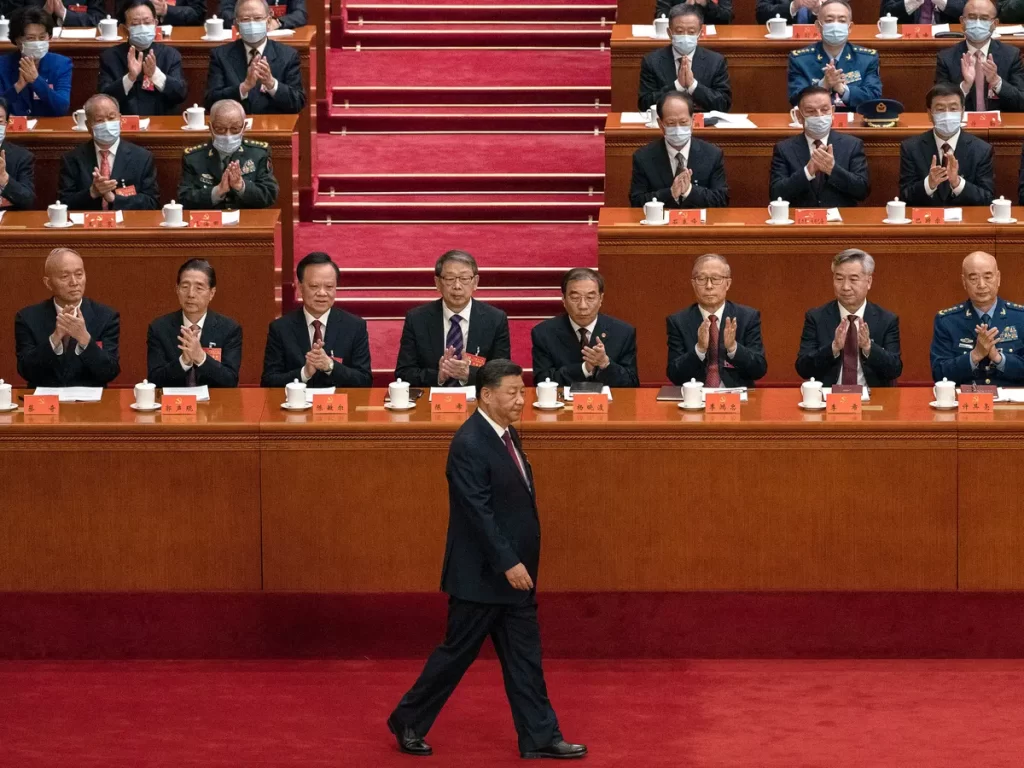China is reportedly planning to extend its social credit system’s principles to the realm of metaverse and online virtual worlds, as stated by a recent POLITICO report.
China Mobile, a state-owned telecommunications company, has proposed the introduction of a digital identification system for users in these virtual spaces.
This digital ID would encompass both “natural characteristics” and “social characteristics” of users, aiming to maintain order and safety within the virtual environment.
The proposed digital ID would contain an array of personal information and distinctive markers, including a person’s occupation.
This data would be stored permanently and made accessible to authorities.
The system’s advantages were illustrated by its potential to swiftly identify and penalize disruptive users, such as those spreading false information or causing disturbances within the metaverse.
The concept of this digital ID system draws parallels with China’s existing social credit system, which is designed to assess and rank citizens based on various behaviors and metrics.
Notably, this system has been employed as a means of enforcement. In 2018, instances of social offenders being denied airplane tickets amounted to 17.5 million, while 5.5 million individuals faced restrictions on purchasing train tickets.
READ MORE: US Tech Giant Fires New Warning About ChatGPT
China Mobile unveiled these proposals during discussions with a focus group centered around the metaverse, organized by the International Telecommunication Union (ITU), a United Nations agency specializing in communications technology.
The metaverse focus group, slated to reconvene in October, could potentially vote on these proposals, thereby influencing the practices of telecommunications companies and tech firms.
Chinese companies participating in this focus group reportedly outnumbered their American and European counterparts in submitting metaverse-related proposals.
According to a contributor within the group who spoke with POLITICO, China seems to be strategically positioning itself as a dominant force in shaping metaverse standards for widespread adoption.
This move could pave the way for Chinese authorities to dictate identity protocols within virtual environments, prompting concerns about the kind of immersive world that would result.
In essence, China’s intention to extend its social credit system’s principles to the metaverse and virtual realms is causing ripples of debate within the tech community.
As the ITU’s metaverse group discusses and potentially votes on these proposals, the digital landscape’s future standards and regulations hang in the balance.
Other Stories:
Crypto Influencer Files $16 Million Lawsuit Against Bitget Exchange
Bored Ape Yacht Club’s Yuga Labs to Scale Back OpenSea Support
FTX founder Sam Bankman-Fried, whose bail was recently revoked by a federal judge, is now seeking permission to spend five weekdays outside of detention to collaborate with his legal team in preparing his defense case.
His legal representatives conveyed that he was facing challenges in thoroughly reviewing extensive case-related documents while confined in the Metropolitan Detention Center in Brooklyn, New York.
Christian Everdell, SBF’s attorney, highlighted the substantial document production delays by the government, including three-quarters of a million pages of Slack communications.
Everdell asserted that allowing SBF access to his legal team and an internet-enabled laptop within the courthouse premises would expedite proceedings, considering his fraud trial scheduled for October.
SBF is contesting allegations of orchestrating an elaborate fraud scheme involving unauthorized access to billions of dollars from FTX customer funds for personal gain.
Prosecutors argued that for SBF to introduce a defense centered around advice received, he must promptly provide information about its origin; failure to do so might bar this defense during the trial.
While prosecutors mentioned their ability to provide information on hard drives, limitations prevent all data from being stored on laptops or drives.
Despite prison authorities rejecting a plan to relocate SBF for laptop access, a judge’s decision on his requests is still pending.
READ MORE: Tether Discontinues Bitcoin Omni Layer Version Due to Waning Interest
In the realm of Decentralized Finance (DeFi), Curve Finance pledged to reimburse victims of a recent hack amounting to $62 million in losses.
Investigations have yielded progress, with approximately 79% of the funds recovered.
The platform will assess each affected user for reimbursement to ensure equitable distribution of resources.
Additionally, Zunami Protocol faced an attack on its stablecoin pools on Curve Finance, resulting in a loss estimated at $2.1 million.
\However, the DeFi landscape also witnessed positive developments, including ConsenSys’ launch of the Ethereum scaling rollup Linea, bridging over $26 million in ETH and offering enhanced throughput for DApps.
SpiritSwap, a Fantom-based DEX, was rescued from shutdown via a community resolution transferring the project to Power, avoiding closure due to treasury funds being stuck on the Multichain protocol.
Despite market fluctuations, DeFi’s total value locked in protocols surged to $49.8 billion, marking a five-month high.
Other Stories:
Bitcoin Hovers Near 2-Month Lows Amidst Extensive Liquidations and Market Uncertainty
Shiba Inu’s Shibarium Network Restarts Block Production After Temporary Pause
Former US President Donald Trump’s Ethereum Wallet Surges to $2.8 Million
The December 2020 lawsuit by the United States Securities and Exchange Commission (SEC) against Ripple has significantly hindered the growth and adoption of the XRP token in the United States, according to pro-XRP advocate John Deaton, as conveyed in a recent post on X (formerly Twitter).
Deaton’s remarks came in response to Coinbase’s recent announcement of acquiring a minority stake in Circle, the issuer of USD Coin (USDC).
Coinbase’s plan to enhance the USDC ecosystem prompted Deaton to reflect on the missed potential for Ripple and XRP in the cross-border payment arena, suggesting that Coinbase’s interest might have been similarly sparked if not for the SEC’s legal action.
The pro-XRP advocate underscored that Coinbase had once actively supported XRP, but the lawsuit compelled the platform to remove the token.
He noted that Coinbase had taken thorough precautions, reaching out to the SEC to ascertain XRP’s regulatory standing before listing it.
In a January 2019 meeting with the SEC, Coinbase had explained its stringent regulatory evaluation process, which had even garnered praise from a senior SEC staff member.
At the time, the SEC raised no objections to Coinbase’s proposal, leading to the listing of XRP on the exchange in February 2019.
Similarly, MoneyGram, a major payment processor and a key partner of Ripple in remittances, had submitted a filing to the SEC outlining its plans for XRP usage.
This submission faced no regulatory challenges.
READ MORE: Binance Contemplates Legal Action Against Former Payment Provider
Deaton highlighted that both Coinbase’s legal team and MoneyGram had, through their evaluations, determined XRP not to be a security, a view that the SEC itself had seemingly shared in June 2018.
Despite these assessments, the SEC initiated a lawsuit against Ripple in December 2020.
The pro-XRP advocate argued that the lawsuit was wielded as a weapon and emphasized that the evidence accumulated over the past three years supports this assertion.
Deaton concluded that the lawsuit inflicted notable harm on XRP’s adoption, despite Ripple’s continued accomplishments abroad.
Notably, on July 13, New York District Court Judge Analisa Torres issued a partial ruling in favor of Ripple Labs, determining that the sale of XRP on digital asset exchanges should not be considered a security.
In summary, the SEC’s lawsuit against Ripple in December 2020 had a detrimental impact on the adoption and growth of the XRP token within the United States.
Proponents of XRP, like John Deaton, argue that the legal action hindered the trajectory that Ripple and XRP were on, potentially stalling their adoption in cross-border payments and curtailing opportunities for partnerships with entities like Coinbase.
Other Stories:
Ripple Labs vs. SEC: Appeals Process Sparks Debate Over Ongoing Legal Case
Coinbase, a prominent cryptocurrency exchange headquartered in the United States, has launched a new campaign urging crypto enthusiasts to directly engage with lawmakers.
The initiative, named the “Stand with Crypto Alliance,” has garnered significant attention, with over 54,000 individuals signing up by August 15th.
The main objective is to foster interaction between crypto supporters and federal-level U.S. legislators.
This platform enables users to gauge the stance of members of the U.S. Senate and House of Representatives towards cryptocurrency.
As of the current date, the initiative’s landing page indicates the sentiments of various lawmakers towards crypto policies.
Notably, Senator Elizabeth Warren and Representative Brad Sherman are marked as “strongly against” crypto policies.
On the other side, Representatives Josh Gottheimer, Ritchie Torres, and David Schweikert are noted as being “very supportive.”
Schweikert, in particular, has endorsed three pro-crypto bills during his tenure and has shown interest in digital assets.
However, the initiative’s background also brings to light certain ethical considerations.
Representative Schweikert, despite his involvement in advocating for crypto, has faced ethical issues in the past.
In 2020, he was fined $50,000 by the House Ethics Committee for campaign finance violations that contravened House ethics regulations.
READ MORE;Pro-Bitcoin Politician Surges Ahead in Argentine Presidential Primaries
Subsequently, in 2022, the Federal Election Commission imposed a $125,000 fine related to similar allegations.
These violations revolved around non-disclosure of loans and the improper use of campaign funds for personal purposes.
Notably, the Stand with Crypto Alliance has received donations, including $215 from a crypto user with the Twitter handle “Jerry Mander,” a play on the term “gerrymander.”
Additionally, there was an unverified $191.98 contribution, potentially from Roger Bartlett, Coinbase’s head of institutional operations solutions and Coinbase Treasury.
This initiative aligns with Coinbase’s ongoing efforts to support “pro-crypto candidates” in the U.S. political landscape.
Currently, Coinbase is entangled in a legal dispute with the U.S. Securities and Exchange Commission (SEC) over allegations of conducting unregistered securities offerings.
Amidst this legal battle, calls from various quarters, including lawmakers and industry proponents, have emerged, urging the regulator to drop the case.
In conclusion, Coinbase’s latest endeavor, the Stand with Crypto Alliance, seeks to facilitate direct communication between cryptocurrency proponents and U.S. legislators.
However, the initiative’s backdrop also highlights ethical concerns related to certain lawmakers involved.
This initiative is part of Coinbase’s broader strategy to promote favorable crypto policies and navigate its ongoing legal challenges.
Other Stories:
Voyager Digital’s Massive Token Transfers Spark Speculation of Impending Sell-Off
Zunami Protocol Issues Warning Amidst Attack on Stablecoin Pools on Curve Finance
Former FTX CEO Sam Bankman-Fried Detained in Notorious Brooklyn Jail
OpenAI, the creator of ChatGPT, is promoting the integration of artificial intelligence (AI) into content moderation processes, highlighting its potential to optimize operational efficiency within social media platforms by accelerating the handling of complex tasks.
The organization asserted that its latest innovation, the GPT-4 AI model, has the capacity to drastically condense the duration of content moderation efforts, reducing timelines from months to mere hours and thereby ensuring heightened consistency in content categorization.
For social media giants like Meta, the parent company of Facebook, content moderation proves to be a formidable challenge.
This task involves orchestrating the efforts of numerous global moderators to prevent the dissemination of harmful materials like explicit imagery and violent content.
The conventional content moderation process, known for its sluggishness, places a considerable mental burden on human moderators.
OpenAI’s system promises to streamline the formulation and customization of content policies, significantly reducing the timeline from months to hours.
OpenAI is actively exploring the potential of leveraging large language models (LLMs) to address these challenges.
READ MORE: Voyager Digital’s Massive Token Transfers Spark Speculation of Impending Sell-Off
The adeptness of their language models, such as GPT-4, positions them as viable tools for content moderation, as they can make decisions based on established policy guidelines.
The predictive capabilities of ChatGPT-4 can refine smaller models to handle vast volumes of data, leading to improved content moderation in various aspects, including label consistency, a rapid feedback loop, and alleviation of cognitive strain on human moderators.
The organization’s statement emphasized ongoing efforts to enhance GPT-4’s prediction accuracy.
This involves investigating the integration of chain-of-thought reasoning or self-critique mechanisms.
Furthermore, OpenAI is experimenting with methods to identify unfamiliar risks, drawing inspiration from constitutional AI.
OpenAI’s primary objective is to employ these models to identify potentially harmful content based on broad definitions of harm.
The insights garnered from these endeavors will contribute to the evolution of existing content policies and the development of novel ones in unexplored risk domains.
On August 15th, OpenAI CEO Sam Altman clarified the organization’s stance on not utilizing user-generated data to train its AI models.
Other Stories:
Former FTX CEO Sam Bankman-Fried Detained in Notorious Brooklyn Jail
Zunami Protocol Issues Warning Amidst Attack on Stablecoin Pools on Curve Finance
Pro-Bitcoin Politician Surges Ahead in Argentine Presidential Primaries
In a significant political development, an Argentine politician advocating for Bitcoin adoption and the dismantling of the central bank has surged ahead in the country’s presidential open primary elections.
With more than 90% of the votes counted, Javier Milei, a prominent libertarian with pro-Bitcoin sentiments, has taken the lead with an impressive nearly 32% of the votes.
This places him ahead of the conservative Together for Change party, which has secured just under 30% of the votes, according to data from Bloomberg.
The Union for the Homeland coalition, representing the incumbent government, stands at the third position with slightly over 28.5% of the total votes.
Milei, a central figure in the Liberty Advances coalition (La Libertad Avanza), has been associated with views that span from libertarian to far-right ideologies.
Milei, who identifies as an anarcho-capitalist, has been a vocal proponent of abolishing Argentina’s central bank, labeling it a fraudulent institution.
He has also controversially stated that the trading of human organs should be treated as a regular market transaction.
He attributes the rise of Bitcoin to a response against what he terms “central bank scammers.”
READ MORE: Hacker’s Tether Address Blacklisted with Police and Cyber Support, Stolen Crypto Recovery Progresses
Furthermore, he argues that fiat currency enables politicians to exploit Argentinians through inflation, a message that has struck a chord with the country’s populace.
The resonance of Milei’s rhetoric among voters is driven by Argentina’s staggering annual inflation rate of 116%, the highest in over 30 years.
This dire economic situation has exacerbated the country’s ongoing cost of living crisis, making the call for alternative financial mechanisms like Bitcoin more appealing to a frustrated electorate.
The culmination of this political landscape will be Argentina’s general presidential election scheduled for October 22nd.
In the event that no candidate secures a minimum of 45% of the votes, a runoff election is slated for November.
As the nation grapples with economic challenges and increasing public support for unconventional approaches, the upcoming election holds the potential for a significant shift in Argentina’s political trajectory.
Other Stories:
Former FTX CEO Sam Bankman-Fried’s Bail Revoked Over Witness Intimidation Allegations
PayPal, a leading player in the payments industry, has introduced an innovative feature named Cryptocurrencies Hub in its updated terms and conditions.
This move comes on the heels of the launch of their dollar-backed stablecoin, PayPal USD (PYUSD). The new feature enables users to not only store but also engage with cryptocurrencies like Bitcoin within their PayPal accounts.
The revised terms and conditions provide a comprehensive outline for crypto enthusiasts who wish to utilize PayPal’s platform for crypto-related activities.
The Cryptocurrencies Hub offers a range of services, including buying and selling cryptocurrencies.
Moreover, it offers a seamless method to make purchases via PayPal by utilizing the proceeds from cryptocurrency sales.
Additionally, the Cryptocurrencies Hub plays a pivotal role in the conversion of PYUSD to other crypto assets.
However, PayPal clarifies that the balances within the Cryptocurrencies Hub signify ownership of specific amounts of each Crypto Asset, rather than direct possession of the digital Crypto Assets themselves.
Nonetheless, access to this novel feature isn’t universally available to all PayPal users. Eligibility is determined on a case-by-case basis, contingent upon several factors.
To qualify for the Cryptocurrencies Hub, users must possess a personal PayPal account with a well-maintained Balance Account. Furthermore, users need to furnish essential identification information including name, physical address, date of birth, and taxpayer identification number for verification purposes.
It’s noteworthy that the Cryptocurrencies Hub will be directly integrated into the user’s existing PayPal account, accessible using their current credentials.
The feature’s launch has sparked discussions within the crypto community, generating varying perspectives on its implications.
Some proponents envision the potential of PYUSD to expedite the mainstream adoption of Ethereum (ETH).
However, a countering viewpoint raises concerns about potential ramifications for decentralization and individual asset control.
Critics highlight specific aspects of PYUSD’s smart contract, which contain functions like “freezefunds” and “wipefrozenfunds.”
These functionalities are regarded as susceptible to centralization attack vectors within Solidity contracts, prompting a cautious outlook.
In conclusion, PayPal’s introduction of the Cryptocurrencies Hub as part of its updated terms and conditions signifies a substantial stride towards integrating cryptocurrencies into mainstream financial services.
While this innovation is met with excitement, it also triggers discussions surrounding its implications for decentralization and asset control, underscoring the complex nature of the crypto landscape.
Other Stories:
Hacker’s Tether Address Blacklisted with Police and Cyber Support, Stolen Crypto Recovery Progresses
Curve Finance Vows Reimbursement After $62 Million Hack
Former FTX CEO Sam Bankman-Fried’s Bail Revoked Over Witness Intimidation Allegations
Coinbase CEO Brian Armstrong has acknowledged the shortcomings of the Coinbase app’s user experience (UX) after the surge of on-chain activities on its new layer-2 network, Base. Armstrong has pledged to address these issues and enhance the app’s functionality.
In a recent Twitter post on August 13th, Armstrong highlighted the challenges that have come to light during the “Onchain Summer” event.
This event, running from August 9th to August 31st, involves a series of product launches, brand activations, and non-fungible token (NFT) reveals on the Base platform.
Armstrong candidly admitted, “One thing #OnchainSummer is exposing is just how broken our UX is in the main Coinbase app for NFTs, Dapps, and L2s today.
Sorry to say, but true.” He emphasized the importance of acknowledging these issues as a stepping stone towards improvement and innovation.
The CEO stressed that experiences related to NFTs, decentralized applications, and layer 2 solutions should be of the highest quality, and the Onchain Summer event serves as a driving force for such advancements.
Armstrong encouraged users to provide feedback in response to his post, enabling Coinbase to address the most pressing concerns promptly.
He also revealed that rapid updates would be implemented over the next two weeks to tackle major pain points.
Among the user feedback, a significant request came from Friendtech developer Racer.
Racer proposed the integration of a swift settlement credit card on-ramp to Coinbase that eliminates the need for a separate account.
Additionally, a request was made to rectify an ongoing bug that was causing disruptions when connecting Coinbase’s mobile wallet to Google Chrome.
Armstrong acknowledged the persistent nature of this bug and assured users that it would be addressed.
The cryptocurrency industry has long grappled with UX challenges.
An anonymous Web3 UI/UX designer known as 0xDesigner attributed many of these issues to the nature of blockchain-based applications, which are often owner-centric and irreversible.
In light of these challenges, Kirthana Devaser, the content manager of XGo, emphasized the importance of focusing on intuitive user interfaces and making the complexities of blockchain technology less conspicuous in everyday interactions.
This approach, Devaser believes, will be pivotal in driving the next wave of widespread adoption.
As Coinbase acknowledges and addresses the deficiencies in its app’s UX, the company aims to harness user feedback and technological innovation to create a more seamless and user-friendly experience for cryptocurrency enthusiasts and newcomers alike.
Other Stories:
Hacker’s Tether Address Blacklisted with Police and Cyber Support, Stolen Crypto Recovery Progresses
Former FTX CEO Sam Bankman-Fried’s Bail Revoked Over Witness Intimidation Allegations
Curve Finance, the decentralized finance (DeFi) platform, has formally declared its commitment to compensating users affected by the recent security breach, which led to losses amounting to $62 million.
In an official statement posted on X (previously Twitter), the platform reported significant progress in its ongoing investigation, successfully recovering about 79% of the lost funds.
The platform assured that it would evaluate each impacted user’s situation to facilitate fair reimbursement procedures.
This evaluation process aims to establish an equitable distribution of recovered assets among the affected users.
The breach occurred on July 30 and involved malicious actors capitalizing on vulnerabilities present in versions 0.2.15 to 0.3.0 of the Vyper compiler utilized by Curve Finance.
The sophistication and resource-intensive nature of identifying these vulnerabilities were highlighted by experts in the field.
An insider involved with Vyper compiler development noted that the attack likely required meticulous planning for several weeks before its execution.
The attack specifically targeted pools such as CRV/ETH, alETH/ETH, msETH/ETH, and pETH/ETH, raising concerns that the tri-crypto pool on Arbitrum might have also been compromised.
The repercussions of this breach reverberated throughout the broader DeFi landscape, underscoring a fundamental challenge in the emerging cryptocurrency sector: the lack of proper incentives to uncover vulnerabilities in prior software versions.
READ MORE: California Updates Campaign Manuals with Detailed Rules for Cryptocurrency Contributions
To incentivize the responsible individual’s identification, a 10% bounty was offered, leading the attacker to initiate the return of the stolen funds.
As per Etherscan’s records, the current restitution amounts to 4,821 Ether.
In conclusion, Curve Finance, a prominent DeFi platform, has formally announced its commitment to recompense users affected by the recent $62 million hack.
The recovery of nearly 79% of the lost funds, ongoing investigations, and the initiation of fair reimbursement evaluations demonstrate the platform’s dedication to rectifying the situation.
This incident’s impact on the DeFi ecosystem highlights the necessity for improved security practices and incentives to identify vulnerabilities in cryptocurrency software.
The unfolding situation also reinforces the need for continued vigilance within the DeFi space to prevent and mitigate similar events in the future.
Other Stories:
Hong Kong’s HKVAX Granted Preliminary Approval for Virtual Asset Trading Platform by SFC
FTX Debtors Clash with Creditors Over Asset Control Amidst Restructuring Plan
US Bank’s Crypto Holdings Surge to Nearly $170 Million Amid Regulatory Scrutiny
Visa, a leading player in the payments industry, is taking a groundbreaking step that could significantly transform user experiences.
The company is currently in the testing phase of a revolutionary solution that enables users to pay on-chain gas fees using their Visa cards.
In a recent presentation by Mustafa Bedawala, a product manager at Visa, a critical challenge associated with cryptocurrency wallets was highlighted.
This challenge revolves around the constant need for users to manage their Ether balances to cover fluctuating gas fees.
In the traditional Ethereum process, users typically acquire ETH from exchanges or on-ramp services and then transfer these funds to their wallets to cover variable gas fees.
This dynamic adjustment of gas prices often results in users either overspending or having insufficient ETH, leading to complexities and obstacles.
Visa’s ingenious solution capitalizes on Ethereum’s ERC-4337 standard and leverages the “Paymaster” smart contract to facilitate off-chain gas fee settlement.
The procedure involves users initiating an Ethereum transaction through their wallets, which is then directed to the paymaster.
Through a web service, the gas fee is calculated, and Visa is charged via Cybersource.
Following this, a digital signature is generated, swiftly verified, and appended by the wallet before the transaction is sent to the Ethereum network.
The Paymaster confirms the signature and covers the gas fee.
READ MORE: Futurama’s Hilarious Take on Crypto Mining: A Wild West Adventure in ‘Crypto Country’
This novel series of actions empowers users to directly settle gas fees with their Visa cards off-chain, effectively eliminating the need for them to hold ETH solely for the purpose of fee payments.
Reports indicate that Visa has successfully piloted this concept on the Ethereum Goerli testnet, utilizing accessible open-source tools like Stackup’s userop.js library.
During the trial, transactions were able to cover fees through the Paymaster, rendering the necessity for ETH obsolete.
Significantly, this innovation has the potential to streamline experiences for blockchain users by enabling them to directly use their Visa cards to pay gas fees off-chain.
Furthermore, it opens doors to broader implications.
The report underlines the prospect of merchants and decentralized applications adopting the Paymaster framework to enhance customer interactions.
This entails facilitating gas fee payments through Visa cards.
Additionally, this advancement may prompt wallet and Paymaster providers to introduce options for gas fee payments via Visa cards.
In sum, Visa’s ongoing testing of its pioneering solution holds promise for simplifying the cryptocurrency landscape, providing users with more convenience and flexibility while ushering in new possibilities for merchants and service providers.
Other Stories:
Cryptocurrency Asset Flows Continue Negative Trend with $107 Million Outflows
Top VC Firms Face Class-Action Lawsuit for Alleged Role in FTX Crypto Exchange Fraud
PayPal’s PYUSD Stablecoin Launch Triggers Flood of Imposter Tokens and Honeypot Scams












